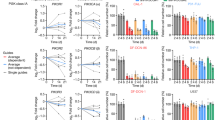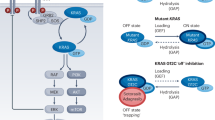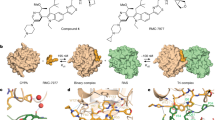Abstract
Emergence of acquired resistance to osimertinib (AZD9291), the first-approved third-generation EGFR inhibitor that selectively and irreversibly inhibits the activating EGFR mutations and the resistant T790M mutation, is a giant and urgent clinical challenge. Fully understanding the biology underlying the response of EGFR mutant non-small cell lung cancer (NSCLC) to osimertinib is the foundation for development of mechanism-driven strategies to overcome acquired resistance to osimertinib or other third-generation EGFR inhibitors. This study focused on tackling this important issue by elucidating the critical role of sterol regulatory element-binding protein 1 (SREBP1) degradation in conferring the response of EGFR mutant NSCLC cells to osimertinib and by validating the strategy via directly targeting SREBP1 for overcoming osimertinib acquired resistance. Osimertinib facilitated degradation of the mature form of SREBP1 (mSREBP1) in a GSK3/FBXW7-dependent manner and reduced protein levels of its regulated genes in EGFR-mutant NSCLC cells/tumors accompanied with suppression of lipogenesis. Once resistant, EGFR-mutant NSCLC cell lines possessed elevated levels of mSREBP1, which were resistant to osimertinib modulation. Both genetic and pharmacological inhibition of SREBP1 sensitized osimertinib-resistant cells and tumors to osimertinib primarily through enhancing Bim-dependent induction of apoptosis, whereas enforced expression of ectopic SREBP1 in sensitive EGFR-mutant NSCLC cells compromised osimertinib’s cell-killing effects. Collectively, we have demonstrated a novel connection between osimertinib and SREBP1 degradation and its impact on the response of EGFR mutant NSCLC cells to osimertinib and suggested an effective strategy for overcoming acquired resistance to osimertinib, and possibly other EGFR inhibitors, via targeting SREBP1.
This is a preview of subscription content, access via your institution
Access options
Subscribe to this journal
Receive 50 print issues and online access
$259.00 per year
only $5.18 per issue
Buy this article
- Purchase on Springer Link
- Instant access to full article PDF
Prices may be subject to local taxes which are calculated during checkout







Similar content being viewed by others
References
Malvezzi M, Carioli G, Bertuccio P, Boffetta P, Levi F, La Vecchia C, et al. European cancer mortality predictions for the year 2017, with focus on lung cancer. Ann Oncol. 2017;28:1117–23.
Siegel RL, Miller KD, Jemal A. Cancer statistics, 2018. CA Cancer J Clin. 2018;68:7–30.
Recondo G, Facchinetti F, Olaussen KA, Besse B, Friboulet L. Making the first move in EGFR-driven or ALK-driven NSCLC: first-generation or next-generation TKI? Nat Rev Clin Oncol. 2018;15:694–708.
Soria JC, Ohe Y, Vansteenkiste J, Reungwetwattana T, Chewaskulyong B, Lee KH, et al. Osimertinib in Untreated EGFR-Mutated Advanced Non-Small-Cell Lung Cancer. N. Engl J Med. 2018;378:113–25.
Röhrig F, Schulze A. The multifaceted roles of fatty acid synthesis in cancer. Nat Rev Cancer. 2016;16:732–49.
Merino Salvador M, Gómez de Cedrón M, Moreno Rubio J, Falagán Martínez S, Sánchez Martínez R, Casado E, et al. Lipid metabolism and lung cancer. Crit Rev Oncol/Hematol. 2017;112:31–40.
Guo D, Reinitz F, Youssef M, Hong C, Nathanson D, Akhavan D, et al. An LXR agonist promotes glioblastoma cell death through inhibition of an EGFR/AKT/SREBP-1/LDLR-dependent pathway. Cancer Discov. 2011;1:442–56.
Yue S, Li J, Lee SY, Lee HJ, Shao T, Song B, et al. Cholesteryl ester accumulation induced by PTEN loss and PI3K/AKT activation underlies human prostate cancer aggressiveness. Cell Metab. 2014;19:393–406.
Guo D, Bell EH, Mischel P, Chakravarti A. Targeting SREBP-1-driven lipid metabolism to treat cancer. Curr Pharm Des. 2014;20:2619–26.
Cheng X, Li J, Guo D. SCAP/SREBPs are Central Players in Lipid Metabolism and Novel Metabolic Targets in Cancer Therapy. Curr Top Med Chem. 2018;18:484–93.
Horton JD, Goldstein JL, Brown MS. SREBPs: activators of the complete program of cholesterol and fatty acid synthesis in the liver. J Clin Investig. 2002;109:1125–31.
Guo D, Prins RM, Dang J, Kuga D, Iwanami A, Soto H, et al. EGFR signaling through an Akt-SREBP-1-dependent, rapamycin-resistant pathway sensitizes glioblastomas to antilipogenic therapy. Sci Signal. 2009;2:ra82.
Shi P, Oh YT, Deng L, Zhang G, Qian G, Zhang S, et al. Overcoming acquired resistance to AZD9291, a third-generation EGFR inhibitor, through modulation of MEK/ERK-dependent Bim and Mcl-1 degradation. Clin Cancer Res. 2017;23:6567–79.
Wee P, Wang Z. Epidermal growth factor receptor cell proliferation signaling pathways. Cancers. 2017;9:52.
Oh WJ, Jacinto E. mTOR complex 2 signaling and functions. Cell Cycle. 2011;10:2305–16.
Li S, Oh YT, Yue P, Khuri FR, Sun SY. Inhibition of mTOR complex 2 induces GSK3/FBXW7-dependent degradation of sterol regulatory element-binding protein 1 (SREBP1) and suppresses lipogenesis in cancer cells. Oncogene. 2016;35:642–50.
Hagiwara A, Cornu M, Cybulski N, Polak P, Betz C, Trapani F, et al. Hepatic mTORC2 activates glycolysis and lipogenesis through Akt, glucokinase, and SREBP1c. Cell Metab. 2012;15:725–38.
Ali A, Levantini E, Teo JT, Goggi J, Clohessy JG, Wu CS, et al. Fatty acid synthase mediates EGFR palmitoylation in EGFR mutated non-small cell lung cancer. EMBO Mol Med. 2018;10:e8313.
Polonio-Alcala E, Palomeras S, Torres-Oteros D, Relat J, Planas M, Feliu L, et al. Fatty acid synthase inhibitor G28 shows anticancer activity in EGFR tyrosine kinase inhibitor resistant lung adenocarcinoma models. Cancers. 2020;12:1283.
Zhou J, Qu G, Zhang G, Wu Z, Liu J, Yang D, et al. Glycerol kinase 5 confers gefitinib resistance through SREBP1/SCD1 signaling pathway. J Exp Clin Cancer Res. 2019;38:96.
Li J, Yan H, Zhao L, Jia W, Yang H, Liu L, et al. Inhibition of SREBP increases gefitinib sensitivity in non-small cell lung cancer cells. Oncotarget. 2016;7:52392–403.
Li Y, Zang H, Qian G, Owonikoko TK, Ramalingam SR. ERK inhibition effectively overcomes acquired resistance of epidermal growth factor receptor-mutant non-small cell lung cancer cells to osimertinib. Cancer. 2020;126:1339–50.
Zhao W, Yu D, Chen Z, Yao W, Yang J, Ramalingam SS, et al. Inhibition of MEK5/ERK5 signaling overcomes acquired resistance to the third generation EGFR inhibitor, osimertinib, via enhancing Bim-dependent apoptosis. Cancer Lett. 2021;519:141–9.
Zang H, Qian G, Arbiser J, Owonikoko TK, Ramalingam SS, Fan S, et al. Overcoming acquired resistance of EGFR-mutant NSCLC cells to the third generation EGFR inhibitor, osimertinib, with the natural product honokiol. Mol Oncol. 2020;14:882–95.
Yu D, Li Y, Sun KD, Gu J, Chen Z, Owonikoko TK, et al. The novel MET inhibitor, HQP8361, possesses single agent activity and enhances therapeutic efficacy of AZD9291 (osimertinib) against AZD9291-resistant NSCLC cells with activated MET. Am J Cancer Res. 2020;10:3316–27.
Sun SY, Yue P, Dawson MI, Shroot B, Michel S, Lamph WW, et al. Differential effects of synthetic nuclear retinoid receptor-selective retinoids on the growth of human non-small cell lung carcinoma cells. Cancer Res. 1997;57:4931–9.
Yao W, Yue P, Zhang G, Owonikoko TK, Khuri FR, Sun SY. Enhancing therapeutic efficacy of the MEK inhibitor, MEK162, by blocking autophagy or inhibiting PI3K/Akt signaling in human lung cancer cells. Cancer Lett. 2015;364:70–78.
Geng F, Cheng X, Wu X, Yoo JY, Cheng C, Guo JY, et al. Inhibition of SOAT1 suppresses glioblastoma growth via blocking SREBP-1-mediated lipogenesis. Clin Cancer Res. 2016;22:5337–48.
Takada M, Zhang W, Suzuki A, Kuroda TS, Yu Z, Inuzuka H, et al. FBW7 loss promotes chromosomal instability and tumorigenesis via cyclin E1/CDK2-mediated phosphorylation of CENP-A. Cancer Res. 2017;77:4881–93.
Acknowledgements
We are thankful to Dr. Dongsheng Wang and Mr. Guojing Zhang in our department for helping us with animal experiments, to Dr. Teng Wang and Dr. Dong Hua (Affiliated Hospital of Jiangnan University) for providing us with clinical samples, to Dr. Peng Zhang (Longgang E.N.T. Hospital & Shenzhen Key Laboratory of E.N.T.) for staining the patients’ samples, and to Drs. Deliang Guo and Wenyi Wei for providing some shRNAs. We are also grateful to Dr. Anthea Hammond in our department for editing the manuscript. This work was supported by the NIH/NCI R01 CA223220 (to S-YS), R01 CA245386 (to S-YS), UG1 CA233259 (to SSR) and lung cancer SPORE P50 CA217691 DRP award (to S-YS) and Emory University Winship Cancer Institute lung cancer pilot funds (to S-YS). DY is a visiting medical student participating in the Xiangya-Emory Visiting Medical Student Program. SSR, TKO, and S-YS are Georgia Research Alliance Distinguished Cancer Scientists.
Author information
Authors and Affiliations
Contributions
Conceptualization: S-YS, ZC, TKO, and SSR. Investigation: ZC and DY. Methodology: ZC and S-YS. Writing/Original draft: ZC and S-YS. Funding acquisition: S-YS and SSR. Supervision: TKO, SSR, and S-YS.
Corresponding author
Ethics declarations
Competing interests
SSR is on consulting/advisory board for AstraZeneca, Amgen, BMS, Merck, Roche, Tesaro and Amgen. TKO is on consulting/advisory board for Novartis, Celgene, Lilly, Sandoz, Abbvie, Eisai, Takeda, Bristol-Myers Squibb, MedImmune, Amgen, AstraZeneca and Boehringer Ingelheim. Other authors declare that they have no conflict of interest.
Additional information
Publisher’s note Springer Nature remains neutral with regard to jurisdictional claims in published maps and institutional affiliations.
Rights and permissions
About this article
Cite this article
Chen, Z., Yu, D., Owonikoko, T.K. et al. Induction of SREBP1 degradation coupled with suppression of SREBP1-mediated lipogenesis impacts the response of EGFR mutant NSCLC cells to osimertinib. Oncogene 40, 6653–6665 (2021). https://doi.org/10.1038/s41388-021-02057-0
Received:
Revised:
Accepted:
Published:
Issue Date:
DOI: https://doi.org/10.1038/s41388-021-02057-0
This article is cited by
-
Targeting glucosylceramide synthase induces antiproliferative and proapoptotic effects in osimertinib-resistant NSCLC cell models
Scientific Reports (2024)
-
Regulation and targeting of SREBP-1 in hepatocellular carcinoma
Cancer and Metastasis Reviews (2023)
-
Targeting apoptosis to manage acquired resistance to third generation EGFR inhibitors
Frontiers of Medicine (2022)



